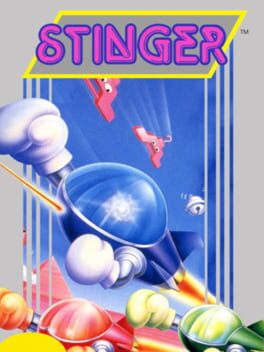As far as Fantasy Zone (1986) is the title commonly cited to illustrate the cute'em up genre, Konami is undoubtedly the real precursor with TwinBee (1985). If Fantasy Zone takes up the idea of Gradius with exponentially expensive upgrades, TwinBee had opted for a formula closer to Xevious (1982), with a vertical scrolling: the subtlety came from the fact that the upgrades were exclusive with each other, which pushed to specialise the ship towards a particular archetype. As a sequel, Stinger takes this concept and adds an alternation between vertical and horizontal levels.
The title places us aboard a ship equipped with arms, which can launch bombs, in addition to the traditional forward fire. Each level consists of a scrolling sequence, where the player has to upgrade their arsenal, concluded by a boss, each with their own gimmick. The concept is rather simple, but decently done. However, there are a few pacing problems: the levels are slightly too long for no reason, and although the environments are varied enough from one level to the next, fatigue sets in within each of them. This lack of finesse is also found in the graphical assets. The scenery is pretty for the time shimmering and thus pleasing to the eye, but the enemies' sprites, as well as their shots, are not overly visible – they certainly lack a border. It often happens that one gets hit by a projectile, which has blended in with the background. Also, the fact that bomb throwing in the vertical levels is conditional on having mechanical arms – which disappear after being hit by a projectile –, is strange. Indeed, in the horizontal levels, the bombs are launched at the same time as the standard shots: this dichotomy is surprising. Finally, the upgrade system with the bells can be frustrating. The player needs to hit them in order to change their colour and get the right upgrade: asking to juggle while dispatching enemies might be a bit too much.
If Stinger remains a pleasant title, while being a decent choice for co-op play, it is still messy in some aspects, showing that the formula has not yet matured. This is probably why history will remember Parodius (1990) much more easily. It amalgamates all the previous attempts, to offer a much better calibrated and pleasant experience.
The title places us aboard a ship equipped with arms, which can launch bombs, in addition to the traditional forward fire. Each level consists of a scrolling sequence, where the player has to upgrade their arsenal, concluded by a boss, each with their own gimmick. The concept is rather simple, but decently done. However, there are a few pacing problems: the levels are slightly too long for no reason, and although the environments are varied enough from one level to the next, fatigue sets in within each of them. This lack of finesse is also found in the graphical assets. The scenery is pretty for the time shimmering and thus pleasing to the eye, but the enemies' sprites, as well as their shots, are not overly visible – they certainly lack a border. It often happens that one gets hit by a projectile, which has blended in with the background. Also, the fact that bomb throwing in the vertical levels is conditional on having mechanical arms – which disappear after being hit by a projectile –, is strange. Indeed, in the horizontal levels, the bombs are launched at the same time as the standard shots: this dichotomy is surprising. Finally, the upgrade system with the bells can be frustrating. The player needs to hit them in order to change their colour and get the right upgrade: asking to juggle while dispatching enemies might be a bit too much.
If Stinger remains a pleasant title, while being a decent choice for co-op play, it is still messy in some aspects, showing that the formula has not yet matured. This is probably why history will remember Parodius (1990) much more easily. It amalgamates all the previous attempts, to offer a much better calibrated and pleasant experience.
